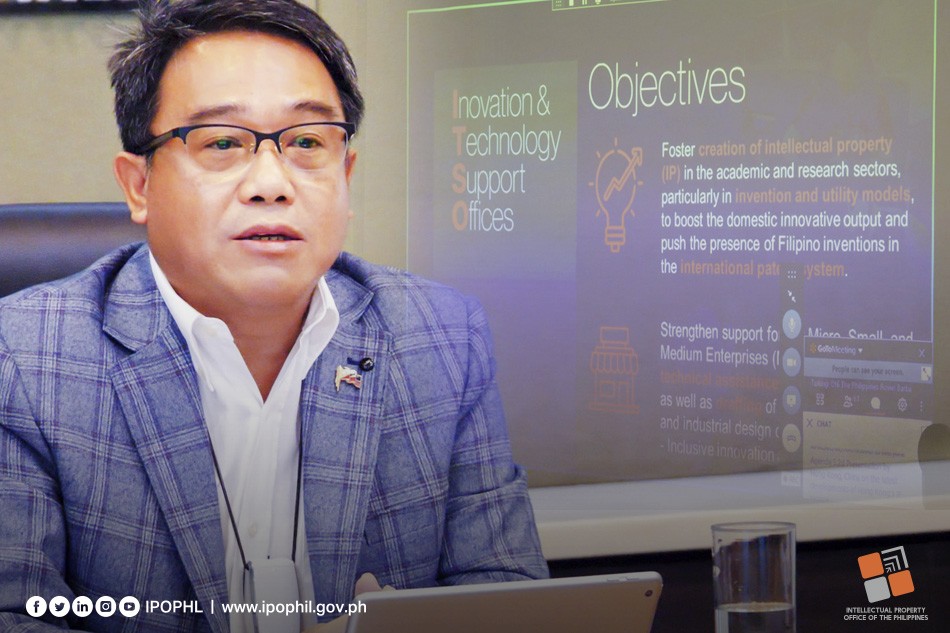
IPOPHL Sees Bigger Global Role in Years Ahead
October 14, 2020
The Intellectual Property Office of the Philippines (IPOPHL) recently shared with peers in the Asia-Pacific Economic Cooperation (APEC) its experience in fostering university innovations to enter the global patents system, touting as flagship initiative its program with the academic community and IPOPHL’s operation as an international authority under the Patent Cooperation Treaty (PCT).
At the meeting of the APEC Intellectual Property Experts Group held Oct. 8, 2020, IPOPHL first noted the success of its Innovation and Technology Support Office (ITSO) Program in mainstreaming IP in the creative and innovative landscapes of higher educational institutions (HEIs).
“The ITSO Program has brought about a change in the culture of academe characterized by greater awareness on the importance of IP protection,” Director General Rowel S. Barba said at the virtual meeting.
Housed in HEIs and R&D centers, IPOPHL-steered ITSOs provide a wide range of capacity building initiatives; subsidize members’ subscription to proprietary databases; and waive select patents fees and annuities on the condition that a member applies through the global Patent Cooperation Treaty (PCT) track.
The ITSO network is currently at 100. Over the years, they have enabled partner-schools to contribute significantly in annual resident IP filings, especially in patents and utility models (UM). UM filings was cited as one of the major drivers for the Philippines to climb four spots to 50th in the Global Innovation Index 2020.
As IPOPHL intensifies work in capacitating ITSOs and widening its network, the agency expects ITSO-driven IP filings to rise 75% in 2025.
IPOPHL’s int’l searching competence to push unis, colleges, to go global
With the anticipation of more filings, IPOPHL said it will put heavier focus on the more challenging but important task of pushing universities' and colleges' presence into global frontiers through the PCT.
The PCT is a cost-effective system that facilitates applications for patent protection in select or all the 152 PCT-contracting economies through single filing instead of multiple, separate filings.
"Intensifying promotion of universities' and colleges' use of and access to the PCT will diversify Philippines' tech offerings in foreign markets. For innovators, the PCT will allow them to tap vaster opportunities and hone their global competitiveness," Barba said.
Key to achieving this push, Barba said, is enhancing IPOPHL’s competence as an International Searching Authority and International Preliminary Examining Authority (ISA/IPEA), a designation it was given in October 2017.
ISA/IPEAs are the only internationally certified bodies authorized to conduct a search and preliminary examination into PCT-applied patents. This step aims to provide the inventor an overview of his technology’s patentability in certain markets, ultimately helping him weigh the risks and opportunities of pursuing an application.
At present, there are only 23 ISA/IPEAs, and two in Southeast Asia which includes the Philippines through IPOPHL.
“It is the mission of IPOPHL to assist our kababayan inventors realize their dreams of seeking international patent protection through our ISA/IPEA services. For this, we are very aggressive in promoting our ISA/IPEA service,” Barba added.
To encourage more Filipino inventors to seek international protection for their inventions, IPOPHL continues to waive fees for ISA/IPEA applications and proactively searches for globally competitive and patentable local inventions, especially across ITSO partners.
At present, the private sector is the top filer under the PCT route, as is common around the world due to the massive R&D funds at their disposal.
Notwithstanding, IPOPHL sees the need to work in closing somehow the gap to achieve a more inclusive participation in increasing the Philippines' global competitiveness.### (Janina Lim, Media Relations Officer)



